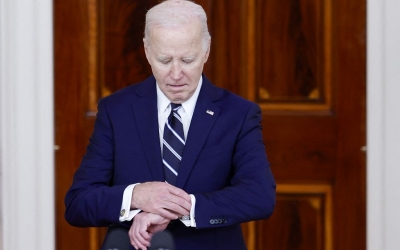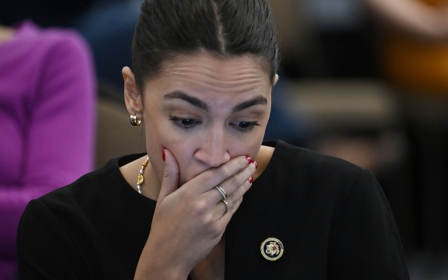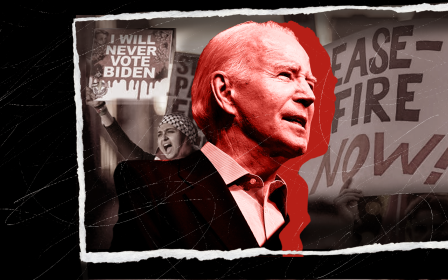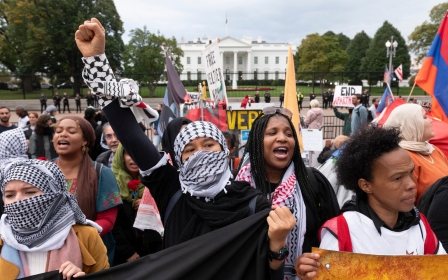Beyond 'Genocide Joe': This election year, Muslim-American voters are at a crossroads
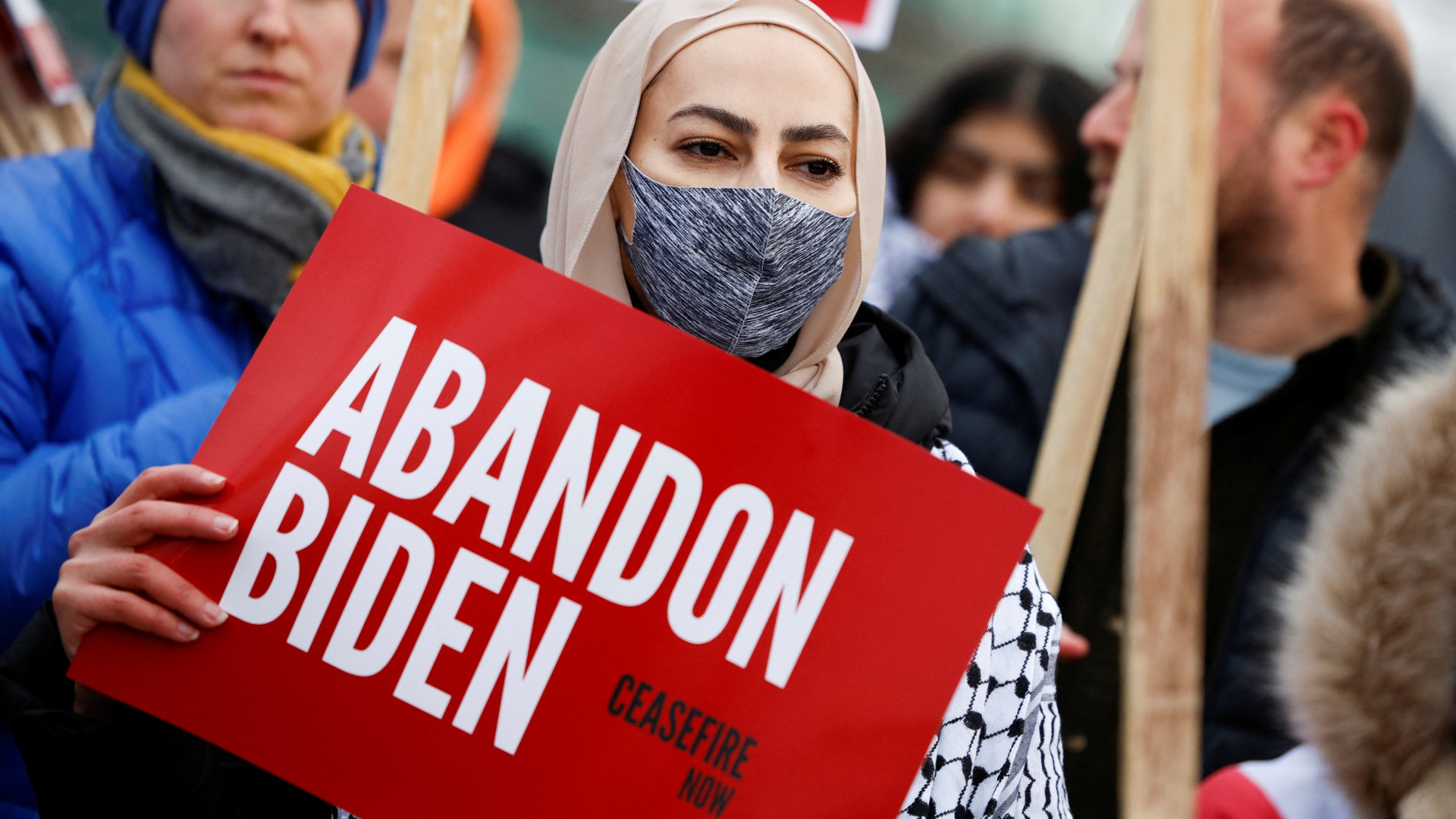
This November, Muslim Americans are poised to make a coordinated impact on the presidential election. With the campaign to #AbandonBiden over President Joe Biden's ham-fisted support for the Israeli assault on Gaza, Muslim and Arab-American voters are at an electoral crossroads.
Short of severing all funding to Israel and pushing for a full war crimes tribunal for Israeli officials, Biden can do nothing to restore this voting base, especially in the key state of Michigan.
Biden gets heckled and booed at every public appearance. Demonstrators have camped out in front of Secretary of State Antony Blinken's home, and Congresswoman Nancy Pelosi has been questioned by Codepink anti-war activists on her comments equating ceasefire demonstrators with Putin apologists.
Education official Tariq Habash resigned from his White House position in protest, and some Arab leaders declined a meeting with Biden's team on its recent Michigan visit.
The disdain is mutual. Women in hijab were refused admission to a "Get out the Vote" event with Kamala Harris despite being ticketed attendees. The event echoed a 2008 "kerfuffle" when visibly-Muslim women were removed from the camera shot at an Obama rally.
Muslim Americans are at a crossroads: they can either condemn Biden as a figure and strategise about electoral alternatives within the two-party system or realise that the solution lies not in a particular elected official but in defeating the most barbaric realities of US empire.
Beyond Biden
"Genocide Joe" is a moniker well-earned by Biden since 7 October 2023, but it just as easily could have been "Bombing Obama" or, say, "Treacherous Trump".
For decades, regardless of the political party, the US presidency has offered a cosy alliance to the Israel lobby group Aipac, and issued a blank check to one of the world's gravest violators of international law.
To personalise the critique of Biden is to forget that he is but an extension of the political system writ large
To personalise the critique of Biden is to forget that he is but an extension of the political system writ large. The question should not be, "How can we punish Biden for his crimes in Gaza?" but rather, "How can we fight the imperialist manoeuvrings of the United States?"
Where I live in Philadelphia, a largely Democratic city, an October City Council resolution unanimously reaffirmed the apartheid state of Israel's right to "defend itself". It offered a blanket condemnation of Hamas, rejecting the clamorous voices of demonstrators outside the building and the vocal protests of Arab and Jewish anti-Zionist voices in the chamber.
Bernie Sanders, once the cherished "Ammo Bernie" in Arab America, took a similar position after 7 October. Thus, his recent opposition to US funding for Israel falls flat. Many former Sanders supporters see his opposition as a hollow attempt to bring jaded Democrats back into the party's orbit as its approval tanks.
Follow Middle East Eye's live coverage of the Israel-Palestine war
Other progressives like Alexandria Ocasio-Cortez and Ro Khanna have offered mealy-mouthed responses to the current atrocity, showing us how the American political system turns all of its participants, even erstwhile critics, into eager imperialists.
The old photographs of Barack Obama dining with Edward Said and Rashid Khalidi come to mind.
Muslim voting history
In 2000, Muslim Americans organised their first-ever bloc vote, agreeing to a unified political position. That George W Bush earned the Muslim bloc vote might come as no surprise: a Gore-Lieberman ticket threatened to continue the Clinton-era anti-Muslim agenda of secret evidence and profiling.
But Bush, under the boondoggle that was the 9/11 attacks, brought a continuation of his father's neoconservative agenda that had brutalised the Global South through a series of coups, invasions, and covert ops. Not long after he won the Muslim vote in 2000, Bush launched an atrociously Islamophobic War on Terror, signed into law the USA Patriot Act, and instituted a brutal programme of detentions and deportations, with working-class Muslim migrants its primary victims.
The 2008 campaign of Barack Obama saw a candidate with activist credentials, offering a fresh new face of "hope and change", embodied most keenly by his racial identity. Yet America's first Black president did little to reverse the Bush years. Obama expanded the Patriot Act, overthrew the Libyan government, classified Muslim civilians killed in US strikes as "enemy combatants", and created a kill list that allowed the US president vast powers in extrajudicial assassinations.
These powers were then left to Trump, who campaigned on an overtly Islamophobic platform (building a Muslim database and instituting a "Muslim ban"). His campaign against Secretary of State Hillary Clinton included some of the crudest Islamophobic tropes on both sides of the aisle.
As Marx famously said: "History repeats itself, first as tragedy, then as farce." In 2020, voters critical of Biden's right-wing, pro-Israel and militarist record were bludgeoned with the reminder that Trump's reelection would bring far worse. In 2024, "but Trump" has once again become a deafening scream - this time, as a farce.
Trump's candidacy reappears as a gift to the Democratic Party establishment and a useful rhetorical bludgeon for critics and dissenters. As Biden implements draconian anti-immigrant border policies and entrenches the alliance with the Netanyahu government, there seems little daylight between him and a Republican opponent.
The next presidential election is nine months away. Like Charlie Brown trying to kick the football once and for all, Muslim-American voters again scramble to "get it right" this election cycle.
The electoral impasse
It was in 1956 that WEB DuBois said: "There is but one evil party with two names, and it will be elected despite all I can do or say."
Muslim Americans are witnessing, streamed to our devices, the horrors of US empire laid bare. This has the potential to activate a radical consciousness, one that recognises the hollowness of civic participation at the empire's core.
In November, many will choose candidates like Claudia de la Cruz and Karina Garcia, endorsing the call to "vote socialist" after these third-party candidates have been vocal about their working-class platform's commitment to a liberated Palestine. Others will vote for Dr Cornel West. In rejecting the Biden presidency, some may even vote for Trump.
Many more will sit out the presidential election or write in "Ceasefire".
There is no lesser evil when both sides endorse ethnic cleansing, building a border wall, expanding police forces, and reducing public spending on housing and health care
More crucially, dissenters are undertaking another kind of political action, that is, direct action. The boycott of Starbucks and McDonalds, the takeover of The New York Times lobby, the disruption of pro-Israel investment giant Vanguard, and the blockage of weapons shipments to Israel pose a dramatic alternative to politically engaged Americans.
As the electoral system sold to us in classroom civics lessons reveals itself to be a farce, the political pageantry of the election cycle no longer seduces the demoralised masses. There is no lesser evil when both sides endorse ethnic cleansing, building a border wall, expanding police forces, and reducing public spending on housing and health care.
"Voting", wrote Howard Zinn, "is easy and marginally useful, but it is a poor substitute for democracy."
The problem is not the Democrats, who gesture toward civic inclusion and diversity while providing material support for the most horrific of crimes. Nor is the problem with Republicans whose free-marketeering is coupled with terrifying and overt racism.
The problem is with American empire itself, which, every four years, asks us to pick a side in a one-sided game - to vote as if our lives depend on it.
The views expressed in this article belong to the author and do not necessarily reflect the editorial policy of Middle East Eye.
Middle East Eye propose une couverture et une analyse indépendantes et incomparables du Moyen-Orient, de l’Afrique du Nord et d’autres régions du monde. Pour en savoir plus sur la reprise de ce contenu et les frais qui s’appliquent, veuillez remplir ce formulaire [en anglais]. Pour en savoir plus sur MEE, cliquez ici [en anglais].



